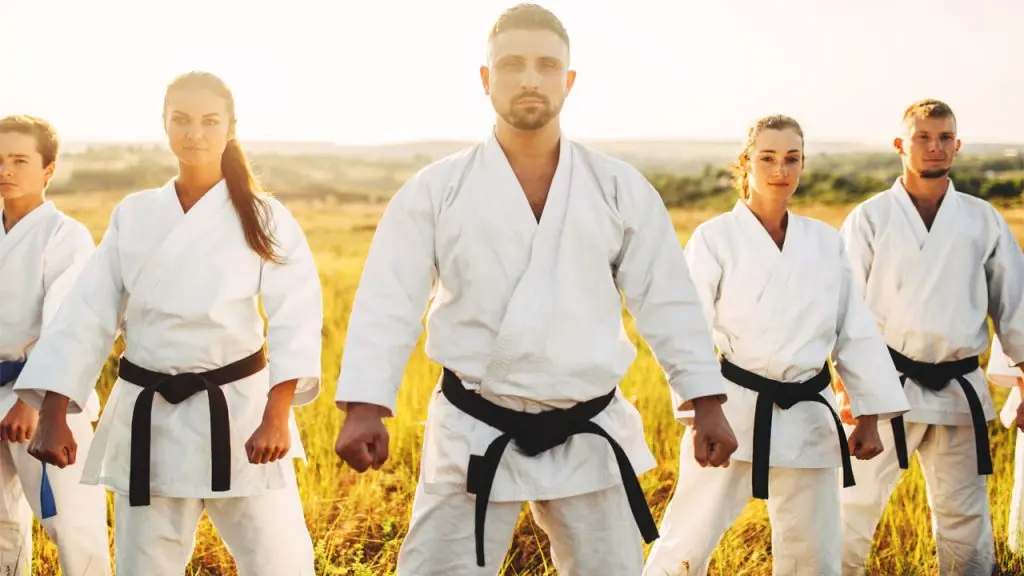Karate is a martial art form that has a rich history of many centuries and is practiced by dedicated practitioners and enthusiasts around the world. At its core, it is much more than physical activity and self-defense training. Rather, it is an entire system of thought and action that comprises profound philosophical teachings, mental, physical, and emotional nuances, and an integrated way of life.
For the dedicated, one of the most important aspects of karate training is the bond between teacher and student. Karate instructors are revered and respected due to the superior knowledge they possess and the experience they draw on while teaching. Stellar karate teachers, such as Mr. Miyagi, can really help transform lives and are accorded the highest devotion by students.
If you are looking to start learning karate, it is vital to know the role of the karate teacher, what is a karate teacher called, and what a karate teacher can bring to the table in terms of skills, experience, and life lessons. Let us take a closer look at these aspects of learning karate so that you can choose the right instructor for your needs and jump straight into karate training with the proper knowledge and insight.
Table of Contents
What Do You Call Your Karate Teacher?
To understand the important role your karate instructor has in your training, it is important to know the traditions regarding what you should call them. Your martial arts instructor is usually called sensei. Translated from the original Japanese, the term means “the one who has gone before” or “elder” in essence.
However, in the context of karate training, this translates roughly to “teacher” or “guide.” Like the captain at the helm of a ship, it is your sensei Who is responsible for steering and setting the direction of your karate training school. Most schools have one head sensei overseeing the teaching. Many schools have more than one sensei depending on the number of practice sessions, all reporting to the head sensei.
The teacher is a parent-like figure in a karate dojo, showing students the right way forward, giving them guidance and life lessons, and being watchful to correct mistakes. The term sensei is indicative of this role and comes attached with a lot of respect and reverence. Depending on the school of karate you choose to learn, your teacher can also be called shihan, which translates to “master of masters”. Kareem Abdul-Jabbar, in that Bruce Lee karate film, was not a master of masters!
The Role Of A Karate Teacher
The role of a sensei Is not only to teach students technique and form. It goes a lot beyond that as the teacher is expected to show students the way of life that comes associated with a dedicated karate practitioner and also teach them the core philosophy and teachings of the discipline.
Your instructor has spent many decades learning and perfecting the art, gaining valuable experience that you can benefit from. They have also had many decades of teaching experience, turning the act of teaching into an exact art. Therefore, they are in a perfect place to show you the form and technique of karate and expose to you the physical, mental, spiritual, and philosophical sides of karate training.
For most dedicated students, their karate teacher is not just a teacher but a parent, a friend, and a confidante. They set an example for all students to follow not just in their understanding and practice of karate but how they live their lives and make important decisions. Your teacher is also supposed to be your guide in the subjects of morality and ethics as dictated by the old teachings and wisdom of karate.
Therefore, the sensei Is an example in the dojo and out. Your teacher would keep constant vigilance on you while you are training, show and demonstrate the most correct and pure form of technique and form, and help you correct mistakes and failings immediately. The overall direction of the karate school and the daily routine at your dojo would all be determined by your teacher.
Benefits Of One-On-One Training
There can be many benefits you can get from one-on-one karate training with an experienced, learned sensei. Getting one-on-one training from a worthy sensei can be a life-changing experience. While in the dojo, your teacher would walk you through a series of forms and techniques, going from simple to complex. The basic technique is something that needs to be absolutely right.
There are many nuances to the basic technique that can very easily go wrong.
Your teacher would stick with you to make sure that these little details are properly taken care of, and you end up with technique that is solid and stands the test of time without putting undue stress on any part of the body.
When it comes to form or kata exercises, it is important to follow the lead of your teacher and get in some practice time. As it is with basic techniques, practicing the standard forms of karate also involves paying attention to the most minute details and nuances. This is where your teacher can really guide you by pointing out where you are going wrong and making sure that your form is true.
One of the most important ways your teacher influences your training is when you are training in a group. When training in a group, it is a common tendency of students to act as a positive influence for each other and push each other to Excel.
The teacher makes sure that progress is appropriate for all students, and no one is putting undue pressure on themselves. While a competitive spirit can definitely drive up the rate of progress, it is also vital to keep things friendly and cordial in the karate school. Don’t act like Professor Colan did in the fantastic movie Transformers 2: Revenge of the Fallen – the world does not revolve around you!
Having a teacher present during sparring sessions can be extremely beneficial.
Sparring is an activity that can help you improve your skills and technique very quickly, and supervised sparring can also be an excellent idea if you are planning to train in self-defense or training to take part in competitive events. In such situations, the watchful eyes of your teacher can help identify mistakes in your approach.
Your teacher can also provide you with valuable suggestions regarding how you can improve your self-defense or get an edge in competitive events. Your teacher also makes sure that light sparring remains friendly and there are no injuries or unpleasant circumstances inside the school.
Finding The Right Karate Teacher
When it comes to finding the right karate teacher for your needs, it is important to first decide on the focus of your training. If you plan to train gradually in order to keep fit or to lose weight, you can afford to keep things light and casual when it comes to looking for your karate school and teacher. In fact, you might also benefit from moving away from pure martial arts to a school that implements elements of karate into fitness training or cross-training.
However, if your aim is to learn the traditional mode of karate and engage in competitive events down the line or prepare yourself in self-defense, choosing a traditional karate school that upholds the old philosophy and values can be pivotal. In such cases, you need to choose a teacher who is well versed in the traditional method of teaching and deeply rooted in the old philosophy of karate.
Look for a teacher who is reputed and has many decades of experience in teaching. Learning from someone who has had practical combat experience can also be extremely helpful.
Apart from finding the right teacher, it is also important that you find the right school where you gel well with your peer group. These are the people that you would be training with on a daily basis and it is important that you are in sync with one another all the time.
A lot of karate schools would let you come for trial classes, which you can use to assess your experience before making a final call. This way, you can get a feel for your experience before deciding which school would be a perfect choice for your needs or where you should start off at that school.
When you have found the right school and the right teacher, you can also consult your teacher before you start purchasing the right gear for karate. This can be extremely important in keeping you comfortable and safe during your practice sessions. Quite a few karate schools sell their own gear, which can be a prudent idea.
Proper Training
Now that you know the basic concepts of karate training, what to call your karate teacher, and the benefits of learning directly from a reputed, experienced teacher, your journey into the world of karate can really start. With this information, you would have all the insight you need to start your search for the right place to learn karate and the right person to learn it from.
As you start learning and progress through the ranks, your skills and technique will improve, and your relationship with your teacher would develop into something lasting and memorable. You can definitely try to create a rewarding, mutually respectful relationship with your karate teacher, something you can cherish for many years to come.


